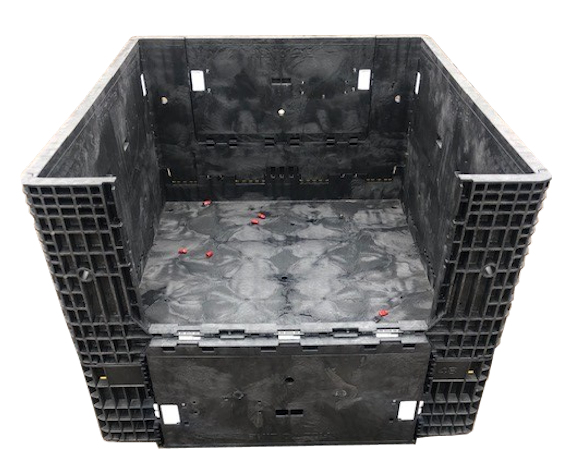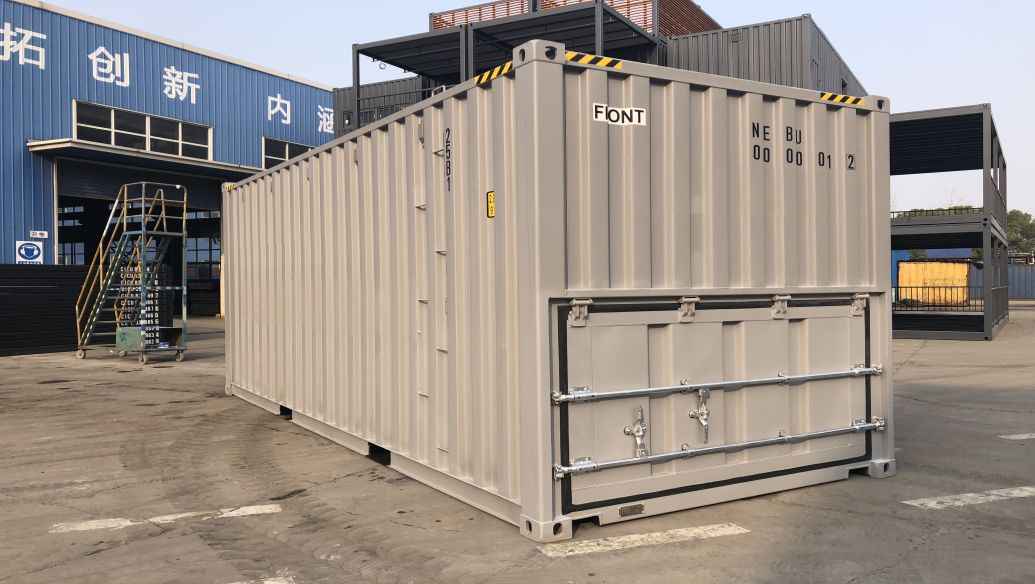Explore the versatility of used collapsible bulk containers in various industries
Wiki Article
Why Mass Containers Are Vital for Cost-efficient and lasting Transportation
Bulk containers play a vital duty in contemporary logistics. They promote the effective activity of large amounts of products, thus enhancing transport procedures. This approach not only lowers expenses but additionally lessens ecological influence via lower emissions and waste generation. As industries look for even more sustainable methods, the adoption of mass containers is coming to be significantly substantial. What implications does this shift hold for future logistics and supply chain administration?
The Benefits of Using Bulk Containers in Logistics
Bulk containers transform logistics by boosting performance and sustainability. These containers permit the transport of big quantities of items in a solitary trip, significantly minimizing the variety of trips called for. This not only simplifies procedures but also decreases labor expenses associated with handling, packing, and unloading. On top of that, mass containers are created to maximize space application within transportation vehicles, ensuring that more items can be shipped all at once.The standardization of mass containers additionally simplifies the logistics process. With uniform measurements, they can be conveniently piled and stored, leading to improved stockroom monitoring. Moreover, mass containers often include durable materials that shield contents from damage throughout transportation, thereby decreasing item loss and increasing total dependability. Therefore, organizations can experience boosted supply chain performance, eventually leading to raised earnings and consumer fulfillment. This mix of aspects makes mass containers a crucial property in modern-day logistics.
Environmental Impact: Decreasing Waste and Carbon Footprint
As sectors significantly focus on sustainability, the adoption of mass containers has become a key technique for lowering waste and reducing carbon impacts. These containers minimize the use of product packaging materials, such as boxes and plastic, thus significantly decreasing overall waste generation. By combining deliveries, bulk containers boost transport performance, permitting more products to be transferred per journey. This reduction in journeys straight associates with reduced greenhouse gas discharges, adding to a smaller carbon footprint.Mass containers can typically be reused or recycled, further mitigating ecological effect. The sturdiness of these containers assurances they can endure several transport cycles, minimizing the need for single-use options. used bulk containers. By simplifying logistics and promoting reliable source use, bulk containers not only support lasting techniques but also urge sectors to line up with global ecological goals. Eventually, their execution reflects a dedication to ecological stewardship and responsible source management
Expense Savings: How Bulk Containers Lower Transportation Expenses
While many firms seek ways to enhance their profits, the use of mass containers offers a significant chance for reducing transport costs. Bulk containers maximize the volume of products transported, allowing businesses to deliver larger amounts at as soon as. This efficiency reduces the variety of journeys needed, directly decreasing gas prices and reducing labor costs connected with loading and unloading.Additionally, bulk containers often include structured styles that enhance space application within transportation lorries. This suggests fewer voids, resulting in a lot more effective use of offered capability. The longevity of bulk containers can decrease the risk of item damage during transit, making certain and reducing losses that even more products get here undamaged.
Enhancing Supply Chain Effectiveness With Mass Storage Solutions
Mass storage space services play a necessary function in enhancing supply chain effectiveness by optimizing inventory administration. By consolidating products into less, bigger containers, businesses can substantially decrease dealing with prices linked with constant transfers and processing. This streamlined method allows for much better monitoring and monitoring of stock, eventually leading to boosted functional efficiency.Streamlined Inventory Management
Efficient inventory monitoring is necessary for maximizing supply chain procedures, specifically when organizations take on bulk storage space services. These options allow services to preserve higher supply levels while decreasing the frequency of replenishment. By combining products into bulk containers, business can streamline their inventory procedures, minimizing the intricacy connected with tracking several smaller sized bundles. This technique helps with precise inventory matters and improves projecting accuracy, permitting even more informed decision-making. Additionally, mass storage space options simplify storehouse company, making it easier to find and access products when required. Consequently, organizations can achieve an extra effective inventory turn over rate, inevitably improving overall supply chain efficiency and decreasing the likelihood of stockouts or overstock scenarios.
Reduced Handling Expenses
The application of mass storage services not just streamlines inventory management but likewise substantially reduces taking care of prices across the supply chain. By combining materials right into bulk containers, business minimize the requirement for constant handling and transfer in between various storage space and transport units. This strategy reduces labor prices connected with loading, unloading, and relocating smaller sized packages. Furthermore, mass storage reduces the frequency of shipments, leading to reduced transportation prices and decreased gas intake. As a result, businesses can enhance their logistics procedures, enabling a more reliable allotment of resources. Ultimately, minimized taking care of prices contribute to improved general supply chain performance, cultivating an atmosphere that sustains both sustainability and economic stability.
Adaptability of Bulk Containers Across Different Industries
Many industries have unique demands for transport and storage, mass containers have arised as a functional solution that fulfills a broad variety of needs. These containers, ranging from big bins to specialized containers, can accommodate diverse products, including powders, granules, and liquids. In the agricultural industry, bulk containers help with the transportation of plant foods and grains, while the food and drink market uses them for active ingredients and completed items. The chemical industry counts on mass containers for securely delivering harmful materials, making sure conformity with safety and security regulations. In addition, building and construction companies benefit from bulk containers for delivering accumulations and various other materials. Their versatility includes different settings of transportation, including vehicles, trains, and ships, enhancing logistical efficiency. This flexibility not only streamlines operations across various sectors yet additionally advertises sustainability by decreasing product packaging waste and optimizing space in transit. Consequently, bulk containers play a necessary duty in modern supply chain management.Future Trends wholesale Container Use and Sustainability
The future of mass container use is significantly formed by ingenious materials growth that improves sustainability. Additionally, automation in logistics promises to streamline operations, decreasing waste and boosting performance. Welcoming round economic climate techniques will certainly further revolutionize just how bulk containers are designed, made use of, and recycled, cultivating an extra sustainable transportation landscape.Ingenious Materials Advancement
As markets increasingly focus on sustainability, ingenious products advancement wholesale containers becomes a considerable consider boosting environmentally friendly transportation services. Researchers and manufacturers are exploring biodegradable plastics, recycled composites, and lightweight metals to minimize ecological impact. These materials not just minimize waste yet additionally enhance gas effectiveness by decreasing the total weight of containers. Furthermore, advancements in clever materials, which can adapt to differing read more problems, enhance the toughness and performance of bulk containers. The assimilation of these ingenious products straightens with circular economic situation principles, promoting reuse and recycling. As the need for lasting practices grows, the development of such materials will certainly play an essential role fit the future of mass container usage in logistics and transportation.Automation in Logistics
Considerable innovations in automation are poised to transform logistics and the usage of mass containers, enhancing sustainability in transportation. Automated systems, including drones and autonomous lorries, are simplifying the movement of bulk containers, lowering the reliance on standard fuel-powered transportation. These modern technologies optimize routing and loading procedures, decreasing empty miles and improving fuel effectiveness. In addition, automated inventory administration systems boost monitoring and monitoring of mass containers, guaranteeing much better source allowance and lowered waste. The combination of the Web of Things (IoT) allows real-time data analysis, making it possible for positive decision-making that lines up with sustainability goals. As automation proceeds to evolve, it is anticipated to drive further advancements in mass container use, eventually sustaining more lasting logistics methods and decreasing the ecological influence of transport.Round Economic Situation Practices
Innovations in automation are establishing the phase for an extra incorporated method to round economic climate techniques in the domain of bulk container usage. As sectors increasingly welcome sustainability, bulk containers are being developed for durability and reusability. This shift not only minimizes waste but also improves source efficiency. Business are embracing strategies such as closed-loop systems, where made use of containers are accumulated, refurbished, and reestablished into the supply chain. Additionally, clever modern technologies track container life process, facilitating far better management and decreasing environmental effect. The cooperation in between makers, logistics service providers, and end-users is essential in establishing standards for sustainable container use. used bulk containers. Future fads indicate an expanding emphasis on materials that are recyclable and biodegradable, more strengthening the round economic situation's principles wholesale transport
Often Asked Concerns
What Materials Are Mass Containers Typically Made From?
Bulk containers are usually constructed from sturdy products such as high-density polyethylene, cardboard, steel, and aluminum. These products offer toughness, flexibility, and defense, making them appropriate for moving numerous goods in different sectors efficiently.How Do I Choose the Right Dimension Bulk Container?
Selecting the right dimension mass container involves reviewing the volume of products to be transferred, taking into consideration handling equipment compatibility, and assessing storage area demands. Appropriate size guarantees efficiency in transport and reduces waste during shipment.Are Mass Containers Reusable or Recyclable?
Mass containers are usually recyclable, made for multiple trips, boosting sustainability. Lots of can likewise be reused, relying on the products utilized. Choosing recyclable options additionally lowers and supports environmental goals waste in transport practices.What Safety And Security Rules Apply to Bulk Container Transport?
Security guidelines for mass container transportation consist of conformity with the Department of Transport standards, correct labeling of harmful products, architectural honesty evaluations, and adherence to weight restrictions to guarantee risk-free handling and protect against mishaps during transportation.Just How Can Businesses Change to Utilizing Mass Containers Efficiently?
Companies can change to bulk containers by examining current logistics, educating personnel on handling, spending in ideal devices, optimizing supply management, and teaming up with vendors to guarantee compatibility and performance throughout the supply chain.
As markets significantly prioritize sustainability, the fostering of bulk containers has actually arised as a key approach for reducing waste and lowering carbon footprints. By settling products right into bulk containers, companies can enhance their inventory processes, minimizing the complexity associated with tracking several smaller sized bundles. As markets increasingly focus on sustainability, innovative materials growth in mass containers arises as a substantial factor in boosting environment-friendly transport solutions. Automated systems, consisting of drones and self-governing cars, are enhancing the activity of bulk containers, minimizing the reliance on standard fuel-powered transportation. Additionally, automated inventory monitoring systems boost monitoring and tracking of bulk containers, ensuring better source allocation and reduced waste.
Report this wiki page